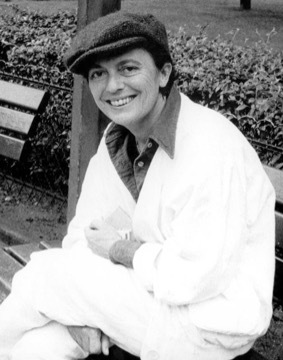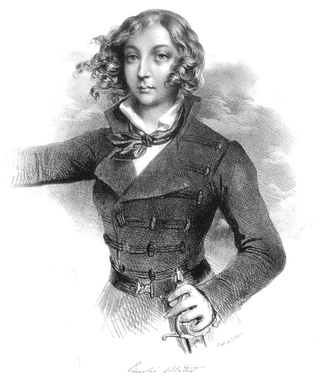Biography
Manuela Gretkowska was born in Łódź and studied philosophy at Jagiellonian University in Kraków. In 1988, she left Poland to live in Paris, where she studied anthropology at the École des hautes études en sciences sociales. In the early 1990s, she returned to her country, where she was deputy editor-in-chief and then literary director at Elle . She wrote columns for Elle, Cosmopolitan , Wprost , Polityka , Machina , and Cogito .
Gretkowska's literary debut was the novel We Are Immigrants Here (My zdies' emigranty) (1991), in which she described the experiences of the young generation leaving Poland. The work of the young artist was favorably reviewed by Czesław Miłosz, whose preface appeared in the first edition. Gretkowska's next three books described the life of a modern artistic-intellectual bohemian living in France: Paris Tarot (1993), Metaphysical Cabaret (1994), and Textbook for people. Skull: The First and Last Volume (1996) connects gnosis, kabbala, the character of Mary Magdalene and the skull motif in global culture. In this period, the writer earned the title of "scandalist" and "postmodernist." Manuela Gretkowski's prose eschewed grandiose language, more similar to the ease and austerity of the essay. In 1996, Gretkowska wrote a screenplay for the Andrzej Żuławski film Szamanka (She-Shaman).
In 1997, Gretkowska moved to Sweden, where she published several collected stories in the book Namiętnik (The Passionate One) (1998), notes from her world travels in Światowidz (World-View) (1998), and her columns, under the collective title Silikon (Silicon) (2000). She also co-wrote the screenplay for the first season of the TV series Miasteczko (Small Town) (2000).
Gretkowska's newest work is more personal, almost intimate prose. Polka (Polish woman) (2001) was the writer's pregnancy journal, while Europejka (European Woman) (2004) presents a humorous view of a changing Poland through the eyes of Gretkowska the intellectual. In 2003 the author, together with her partner Piotr Pietucha wrote Scenes from Extramarital Life. Three years later, Gretkowska wrote a column for the monthly magazine Success that was highly critical of the Kaczyński brothers (twins who at the time held the positions of Poland's President and Prime Minister). The issue hit stands with this text cut out (literally) of every copy.
She lives in Ustanow (near Warsaw) with her daughter Pola and the writer and psychotherapist Piotr Pietucha.
Women's Party
In 2007, Gretkowska transformed the social movement "Poland is a Woman" into a new Political party - the Women's Party (Partia Kobiet), from which she ran a failed campaign in the Polish and European parliaments. In October 2007, after the party's defeat in the parliamentary elections, she resigned the party's leadership but remains an "honorary leader".

Maria Wisława Anna Szymborska was a Polish poet, essayist, translator, and recipient of the 1996 Nobel Prize in Literature. Born in Prowent, she resided in Kraków until the end of her life. In Poland, Szymborska's books have reached sales rivaling prominent prose authors', though she wrote in a poem, "Some Like Poetry", that "perhaps" two in a thousand people like poetry.

Simone Lucie Ernestine Marie Bertrand de Beauvoir was a French existentialist philosopher, writer, social theorist, and feminist activist. Though she did not consider herself a philosopher, nor was she considered one at the time of her death, she had a significant influence on both feminist existentialism and feminist theory.

Aphra Behn was an English playwright, poet, prose writer and translator from the Restoration era. As one of the first English women to earn her living by her writing, she broke cultural barriers and served as a literary role model for later generations of women authors. Rising from obscurity, she came to the notice of Charles II, who employed her as a spy in Antwerp. Upon her return to London and a probable brief stay in debtors' prison, she began writing for the stage. She belonged to a coterie of poets and famous libertines such as John Wilmot, Lord Rochester. Behn wrote under the pastoral pseudonym Astrea. During the turbulent political times of the Exclusion Crisis, she wrote an epilogue and prologue that brought her legal trouble; she thereafter devoted most of her writing to prose genres and translations. A staunch supporter of the Stuart line, Behn declined an invitation from Bishop Burnet to write a welcoming poem to the new king William III. She died shortly after.

Zsuzsanna Emese Mokcsay is a Hungarian-American writer, activist, playwright and songwriter living in America who writes about feminist spirituality and Dianic Wicca under the pen name Zsuzsanna Budapest or Z. Budapest. She is the founder of the Susan B. Anthony Coven #1, which was founded in 1971 as the first women-only witches' coven. She founded the female-only style of Dianic Wicca.

Monique Wittig was a French author, philosopher, and feminist theorist who wrote about abolition of the sex-class system and coined the phrase "heterosexual contract." Her groundbreaking work is titled The Straight Mind and Other Essays. She published her first novel, L'Opoponax, in 1964. Her second novel, Les Guérillères (1969), was a landmark in lesbian feminism.

Countess Emilia Broel-Plater was a Polish–Lithuanian noblewoman and revolutionary from the lands of the partitioned Polish–Lithuanian Commonwealth. Raised in a patriotic tradition in Līksna near Daugavpils, she fought in the November Uprising of 1830–1831 against the Russian Empire. She raised a small unit, participated in several engagements in present-day Lithuania, and received the rank of captain in the Polish insurgent forces. When the main forces under the General Dezydery Chłapowski decided to cease fighting and cross into Prussia, Plater vowed to continue the fight and wanted to cross into Poland where the uprising was still ongoing. However, she fell ill and died.
Rachel Grace Pollack was an American science fiction author, comic book writer, and expert on divinatory tarot.

Olga Nawoja Tokarczuk is a Polish writer, activist, and public intellectual. She is one of the most critically acclaimed and successful authors of her generation in Poland. In 2019, she was awarded the 2018 Nobel Prize in Literature as the first Polish female prose writer for "a narrative imagination that with encyclopedic passion represents the crossing of boundaries as a form of life". For her novel Flights, Tokarczuk was awarded the 2018 Man Booker International Prize. Her works include Primeval and Other Times, Drive Your Plow Over the Bones of the Dead, and The Books of Jacob.
Feminism in Poland describes a collection of movements in Poland working to expand gender equality. Although there are instances of feminist ideas in Poland–most prominently in the expansion of women’s rights under state socialism, the role of women in the fall of communism and the conservative revolution after 1989–feminism as a concept is primarily written off either as an individualistic Western ideal or part of communist ideology.

Maria Pawlikowska-Jasnorzewska, née Kossak, was a Polish poet. She was known as the "Polish Sappho" and "queen of lyrical poetry" during Poland's interwar period. She was also a dramatist.

Szamanka is a 1996 erotic drama film directed by Andrzej Żuławski and adapted from a screenplay by Manuela Gretkowska. The film, which was controversial upon its release in Poland, follows the obsessive relationship between an anthropology professor and a strange young woman only known as the "Italian". The title is the feminine form of the word "shaman" in Polish.
Deanna "D. J." Conway was a non-fiction author of books in the field of magic, Wicca, Druidism, shamanism, metaphysics and the occult, and the author of several fantasy novels. Born in Hood River, Oregon to a family of Irish, North Germanic, and Native North American descent, she studied the occult and Pagan religion for over thirty years. In 1998 she was voted Best Wiccan and New Age author by Silver Chalice, a Neo-Pagan magazine. She was an ordained minister in two New Age churches and holder of a Doctor of Divinity degree. Several of her stories were published in magazines, such as the science fantasy publication Encounters, and she was interviewed in magazines and appeared on such television shows as Journey with Brenda Roberts. She also designed Tarot decks, in collaboration with fellow author Sirona Knight and illustrator Lisa Hunt.
Vicki Noble is an American feminist shamanic healer, author, scholar and wisdom teacher.

Cerridwen Fallingstar, is an American Wiccan priestess, shamanic witch, and author. Since the late 1970s she has written, taught, and lectured about magic, ritual, and metaphysics, and is considered a leading authority on pagan witchcraft.

Maria Ivanovna Arbatova, is a Russian novelist, short story writer, playwright, poet, journalist, talkshow host, politician, and one of Russia's most widely known feminists in the 1990s. When growing up, she was already showing strong controversial ideologies, for instance, she refused to join the Young Communist League, for she preferred to be "a hippy". She studied at the Faculty of Philosophy at Moscow State University, in the Dramatic Arts division of the Gorky Literary Institute, and underwent training in psychoanalysis. She had to leave state university of Moscow "due to ideological conflicts." When she was 19, she became a mother of twins, which complicated her educational processes. She continued studying at the Maxim Gorky Literature institute. After finishing her studies, Maria published some prose and poetry works, however she returned to writing drama, as she claims it is more natural expression for her than other genres. In the pre-perestroika years, the years before 1985, her literary works were banned by censorship. Before glasnost and perestroika, the political program of restructuring and openness of Michail Gorbatsjov, Arbatova had just one play staged, a play that was commissioned. An example of a play that was censored is the play called "Equitation with two knowns". It was banned by the ministry of culture for 10 years. The play is about a female gynecologist performing abortions. The play was misinterpreted as a statement of good or bad of abortion. However the purpose of the play is to bring up the unfair share of responsibility for birth control and child-raising. Nowadays Arbatova is a member of the Moscow Writer's Union and the Union of Theatrical Workers of Russia. She is the author of fourteen plays staged in Russia and abroad, twenty books, and numerous articles in newspapers and periodicals. She has received multiple accolades for her literary and public achievements.
Eden Gray, was the professional name of Priscilla Pardridge, an American actress, and writer on the esoteric meanings of tarot cards and their use in fortune-telling.

Piotr Cezary Skrzynecki was a Polish choreographer, director and cabaret impresario, known for his involvement with the cabaret Piwnica pod Baranami, of which he was the founder.

Irena Krzywicka née Goldberg was a Polish feminist, writer, translator and activist for women's rights, who promoted sexual education, contraception and planned parenthood.

Maria Dulębianka was a Polish artist and activist, notable for promoting women’s suffrage and higher education.

The 2018 Nobel Prize in Literature was awarded to the Polish writer Olga Tokarczuk "for a narrative imagination that with encyclopedic passion represents the crossing of boundaries as a form of life." The prize was announced the following year by the Swedish Academy on 10 October 2019. Tokarczuk is the fifth Nobel laureate in Literature from Poland writing in Polish, after the poet Wisława Szymborska in 1996, and Czesław Miłosz in 1980.














